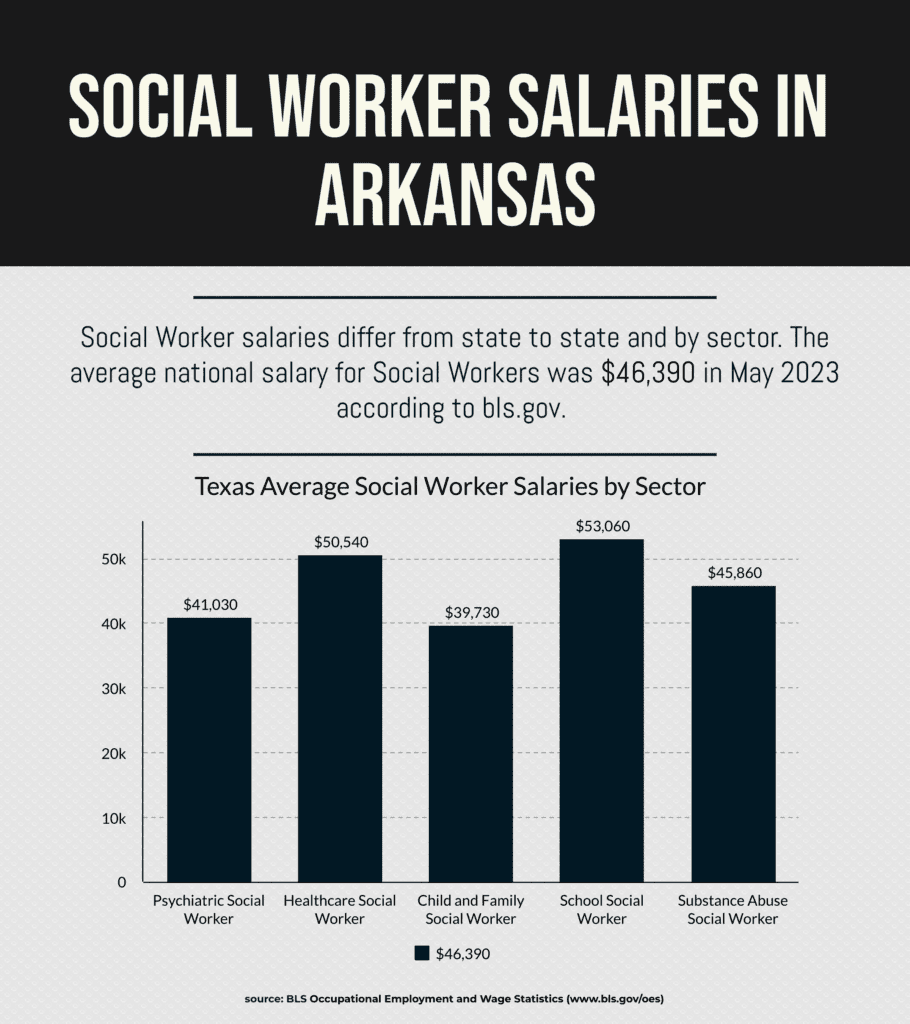
Our guide on how to become a Social Worker in Arkansas explains the education, license, and employment information for a career the state. Learn how to become a Licensed Social Worker LSW in Arkansas.
Arkansas is known for its picturesque Ozark Mountains in the northwestern region and the Ouachita Mountains in the south-central portion of the state. These ranges provide ample opportunities for outdoor activities such as hiking, camping, and fishing.
The state is also home to several rivers, including the Mississippi River, which forms Arkansas’s eastern border, and the Arkansas River, which runs through the center of the state. These waterways offer opportunities for boating, kayaking, and other water sports. Arkansas has a rich history, with significant Native American influences and a strong African American heritage. The state played a prominent role in the Civil Rights Movement and was home to some key events and figures in American history. Overall, Arkansas offers a unique blend of natural beauty, cultural heritage, and economic opportunities.
What Are the Social Work Education Requirements in Arkansas?
The Social Work Degrees available in Arkansas include Associate, Bachelor’s, Master’s, and also Doctoral.
Associate in Social Work (AA or AS)
An Associate in Social Work is a two-year degree program that provides students with foundational knowledge and skills in the field of social work. This program is typically offered at community colleges or technical schools and is designed for individuals who want to start a career in social work or eventually pursue higher education in the field. Students in an Associate in Social Work program learn about human behavior, social welfare policies, communication skills, and ethical practice. Social workers in Arkansas may also gain practical experience through internships or fieldwork.
Bachelor of Social Work (BSW)
A Bachelor of Social Work (BSW) is an undergraduate degree program that prepares students for a career in social work. It typically takes four years to complete and provides a comprehensive education in theories, methods, and practices of social work. Students learn about human behavior, social justice, social policies, and advocacy.
Bachelor’s level Social workers in Arkansas also develop skills in communication, assessment, case management, and intervention strategies. A BSW program often includes fieldwork or internships, allowing students to gain hands-on experience in real-world social work settings. Graduates of a BSW program are eligible to pursue licensure as a licensed certified social worker, and can work in various settings, such as schools, hospitals, social service agencies, and community organizations.
Master of Social Work (MSW)
A Master of Social Work (MSW) is a graduate degree program that builds upon the foundational knowledge and skills of social work acquired at the undergraduate level. It typically takes two years to complete and prepares students for advanced practice in the field of social work. An MSW program focuses on advanced theories, research methods, and specialized areas of practice, such as clinical social work, community organizing, and policy analysis.
Students in an MSW program acquire advanced skills in assessment, intervention, and evaluation. These skills enable them to provide effective and culturally competent services to individuals, families, and also communities. Graduates of an MSW program are eligible for licensure as clinical social workers and can pursue various roles. Some of these include therapist, counselor, advocate, administrator, and also researcher.
Doctoral Degrees in Social Work
A Doctoral Degree in Social Work (DSW or PhD) is the highest level of education in social work. This advanced program prepares social work practitioners to pursue leadership roles in research, policy development, academia, and advanced clinical practice. A doctoral program in social work typically takes three to five years to complete. These programs focus on advanced research methods and theory development to address complex social issues.
Students in a doctoral program engage in independent research and write a dissertation. Many also contribute to the field through scholarly publications and presentations. Graduates with a doctoral degree in social work are equipped to shape social work practice. They contribute to policy changes and advance the profession through leadership, research, and also education.
CSWE Accreditation in Arkansas
The Council on Social Work Education (CSWE) accredits social work programs offered by educational institutions. CSWE sets standards for social work education and ensuring that programs meet these standards through a peer-review process. Accreditation by CSWE signifies that a social work program has met the organization’s rigorous standards for curriculum, faculty qualifications, and also student learning outcomes.
This accreditation is important because it assures students that the accredited program social workers are enrolled in meets the highest quality standards and prepares them for professional practice in the field of social work. Additionally, CSWE Accreditation may also be required for students to be eligible for licensure or to participate in certain professional and financial aid programs.
What Are the Social Work Licensing Requirements in Arkansas?
In Arkansas, social work licensing requirements are governed by the Arkansas Social Work Licensing Board. To become a Licensed Social Worker LSW in the state, individuals must generally hold a Master of Social Work (MSW) degree from an CSWE accredited program.
Social workers must also complete a specified number of supervised post-graduate clinical hours, typically around 3,000 hours. Additionally, individuals must pass a national examination administered by the Association of Social Work Boards (ASWB) and submit an application with the required fees. Continuing education credits are also necessary for license renewal. Specific requirements may vary, so it is important to consult the Arkansas Social Work Licensing Board website for detailed guidelines.
Licensed Social Worker (LSW)
A Licensed Social Worker (LSW) is a professional who has obtained a bachelor’s degree in social work and has met the licensing requirements set by the state. LSWs are qualified to work in a variety of social work settings, such as community organizations, schools, or government agencies, providing support, advocacy, and assistance to individuals, families, and communities.
Social workers may engage in tasks such as conducting assessments, developing service plans, providing counseling, connecting clients with resources, and advocating for social change. LSWs work under the supervision of a licensed social worker or other qualified professionals and contribute to the overall well-being and empowerment of individuals and communities.
Licensed Master Social Worker (LMSW)
A Licensed Master Social Worker (LMSW) is a professional who has obtained a master’s degree in social work and has met the licensing requirements set by the state. LMSWs have completed the necessary education and supervised experience to gain licensure and are qualified to provide social work services independently. Social workers work in various settings, such as hospitals, mental health agencies, schools, or private practice, providing counseling, therapy, case management, advocacy, and other social work interventions.
LMSWs play a vital role in supporting individuals, families, and communities, addressing social issues, and promoting well-being. They may also work towards advanced licensure and pursue additional certifications or specializations in specific areas of social work practice.
Licensed Certified Social Worker (LCSW)
A Licensed Clinical Social Worker (LCSW) is a licensed professional who has completed a master’s degree in social work and has met the requirements for clinical practice set by the state. Additionally, applicants need two (2) years and four thousand (4,000) hours of post-graduate LCSW supervised social work experience in a clinical or non-clinical setting.
LCSWs are trained to provide therapeutic services, including psychotherapy, counseling, and assessment, to individuals, couples, families, and groups. A clinical social worker has extensive knowledge in diagnosing and treating mental, emotional, and behavioral disorders, as well as addressing psychosocial issues.
These professionals often work in private practice, hospitals, clinics, or other healthcare settings, collaborating with multidisciplinary teams to provide comprehensive care. They are licensed to independently practice clinical social work and may also engage in areas such as advocacy, program development, and also administration.
Can Social Workers Get a License by Endorsement in Arkansas?
Yes, social workers can obtain a social work license by endorsement in Arkansas. Social work licensing by endorsement allows individuals who are already licensed social workers in another state to obtain a license in a different state without having to repeat the full licensing process.
To obtain a social work license by endorsement in Arkansas, social workers will typically need to meet the following requirements:
- Hold a current and active social work license in good standing from another state.
- Submit an application for endorsement to the Arkansas Social Work Licensing Board.
- Provide documentation of your education and supervised experience hours from your previous state.
- Pay the required fees.
- Pass any additional examination or background check requirements set by the Arkansas Social Work Licensing Board.
It is important to note that requirements for endorsement may vary, so it is advisable to contact the Arkansas Social Work Licensing Board directly to obtain the most accurate and up-to-date information.
How Long Does it Take to Become a Social Worker in Arkansas?
The length of time it takes to become a social worker in Arkansas depends on the level of education and the specific program you choose. Here is an overview of the typical paths to becoming a social worker in Arkansas:
Bachelor’s Degree in Social Work (BSW)
This is the minimum educational requirement to become a social worker. A bachelor’s degree program usually takes four years to complete, including general education courses, internet courses and social work-specific coursework. After graduation with a bachelor’s degree, you can apply for entry-level social work positions.
Master’s Degree in Social Work (MSW)
While a BSW is sufficient for some entry-level jobs, a licensed master social worker LMSW needs a master’s degree. It is often required for advanced positions and clinical roles. A licensed master social worker LMSW with a master’s degree typically takes two years to complete if pursued on a full-time basis. However, some universities offer accelerated or part-time programs that may take longer.
Licensure
Arkansas requires social workers to be licensed. To obtain a license, you must complete an MSW from a program accredited by the Council on Social Work Education, accumulate supervised work experience, and pass the appropriate licensing exam. The licensure process can take additional time beyond completing the educational requirements.
Continuing Education
Arkansas board requires a criminal background check as well as continuing education courses to receive an Arkansas social work license.
Overall, the time it takes to become a licensed master social worker in Arkansas can range from four to six years for a BSW
How Much Do Social Workers Make In Arkansas?
In Arkansas, social workers make an average annual salary of around $46,390. Salaries may differ based on factors like education, experience, and location within the state. Also be prepared for a criminal background check.

The average salary for a graduate from a regional accreditation program in Arkansas is around $48,000 per year. Salaries range from $34,630 to $97,660 per year. The US Bureau of Labor Statistics (BLS) reports the below Social Work career categories in Arkansas with average salaries.
| Arkansas Social Worker Careers | Average Salary |
|---|---|
| Child, Family, and School Social Workers | $42,160 (BLS) |
| Healthcare Social Workers | $56,630 (BLS) |
| Mental Health and Substance Abuse Social Workers | $45,380 (BLS) |
| Social Workers, All Other | $53,460 (BLS) |
Social work prepares students for work in various professional organizations. Social workers can help with clinical supervision or work as a school social worker. There are several types of professional organizations that would be of interest.
Related:

